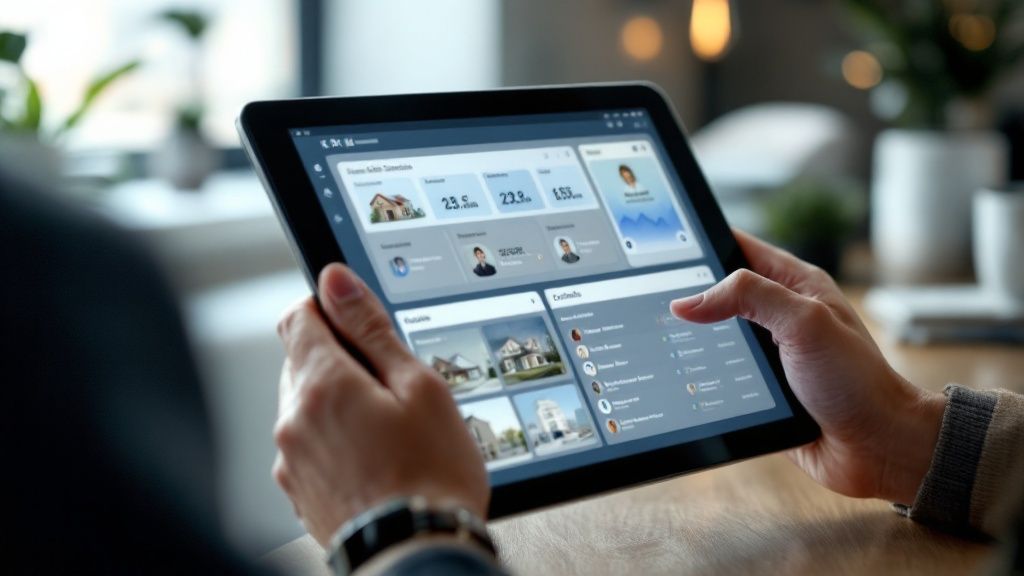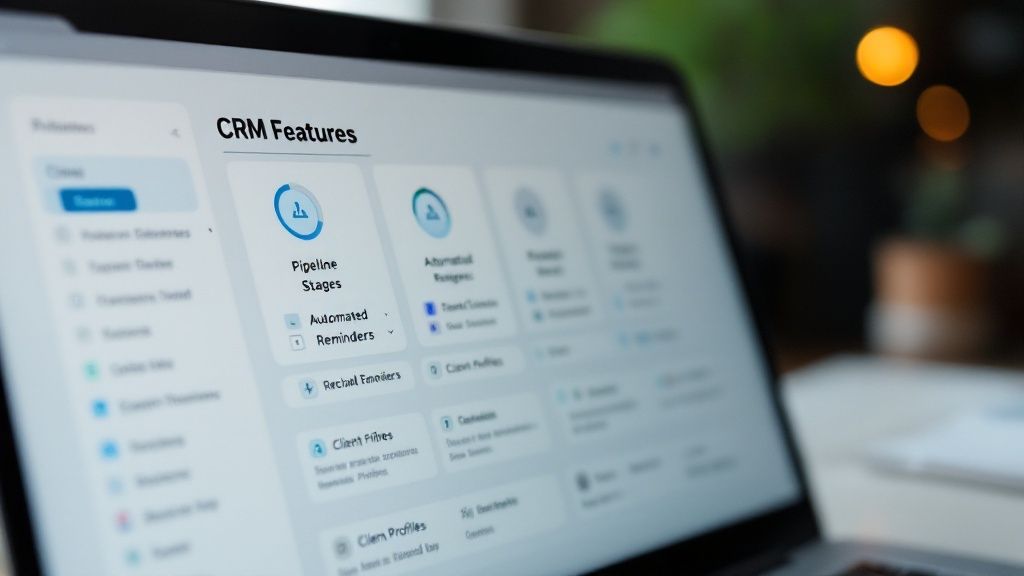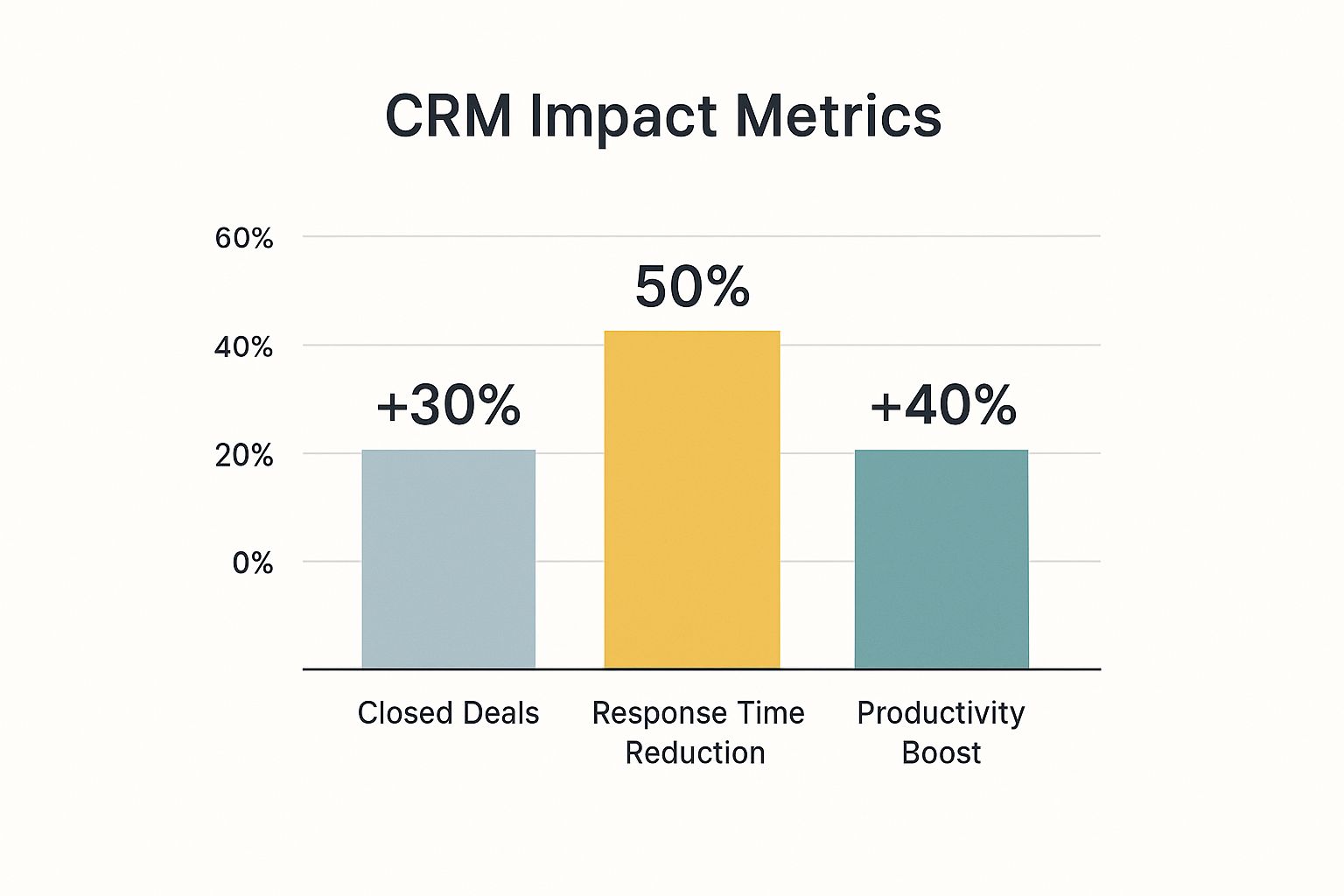Still trying to manage your real estate clients with a clunky spreadsheet or a basic contacts list? You're not the only one. But let's be honest, that old-school approach is a recipe for missed follow-ups and lost deals, causing more headaches than it solves.
Why Generic Tools Just Don't Cut It in Real Estate

If you're in real estate, your day is a constant juggle. You're bouncing between client details, property viewings, and contract deadlines. Relying on generic tools like Excel or your phone's address book is like trying to build a house with just a hammer—sure, you might get somewhere, but it's going to be slow, messy, and full of costly mistakes. These tools simply weren't built for the fast-paced, relationship-driven world of property.
Think of a proper customer relationship management software for real estate as your expert personal assistant, one who works around the clock. It’s a modern solution designed from the ground up to handle the unique rhythm of your industry, turning daily chaos into organised calm.
The Problem with Manual Tracking
Let’s face it, a spreadsheet can't ping you with a reminder for a client's home-buying anniversary or automatically log every single email you’ve sent them. A generic contacts app won't give you a clean, visual snapshot of your entire sales pipeline. This manual way of doing things leaves huge gaps where crucial information just falls through the cracks.
The real issue with generic tools is that they lack context. They’re just data buckets. A real estate CRM, on the other hand, is built to transform every bit of data into a chance to build a stronger relationship.
Without a system that’s actually built for the job, you’re risking:
- Forgetting crucial follow-ups with hot leads, leaving the door wide open for your competition.
- Losing track of what your clients want, which leads to communication that feels impersonal and just plain misses the mark.
- Wasting hours on admin tasks that could—and should—be automated.
The Power of a Specialised Solution
A real estate CRM brings every call, email, and meeting note together into one neat, accessible profile for each client. For a deeper dive on this, check out our guide on real estate customer management. This gives you a crystal-clear view of your entire sales pipeline at a glance, from the first "hello" to closing the deal and beyond.
Imagine having a system that automatically reminds you of key dates, helps you group your contacts for targeted marketing, and even shows you which lead sources are bringing in the most business. This isn't just about getting organised. It’s about building a more resilient, scalable, and ultimately, more profitable business. That’s the power of a dedicated CRM—it gets that success in property is all about the long game and the relationships you build along the way.
How A Real Estate CRM Actually Works

Let’s peel back the curtain on what a real estate CRM really does. Think of it as far more than a digital Rolodex—calling it “just a contact list” is like calling a smartphone “just a phone.” At its heart, a CRM turns fragmented details into meaningful insights, weaving every client interaction into a cohesive story.
Its job begins the moment someone lands on your website or asks about a property and doesn’t stop decades down the track—imagine sending a congratulations note on their five-year sale anniversary. In effect, it ties together every touchpoint and flags critical moments along the way.
This full-cycle tracking is one reason the Australian CRM market is booming. Valued at USD 1.97 billion in 2024, it’s on course to reach USD 5.01 billion by 2033. Such growth reflects real estate’s appetite for tools that deepen engagement and simplify day-to-day operations. For more detail, check out the full Australian CRM market report.
From Lead Nurturing To Closing Deals
In practice, ‘lead nurturing’ is where a CRM shines. Rather than juggling spreadsheets or sticky notes, the system can:
- Send personalised market updates automatically
- Queue follow-up emails based on client interests
- Flag high-priority leads for immediate attention
A great CRM doesn’t just store names; it sparks action. It’s the shift from having a list to executing a tailored plan for each contact.
All this data flows into your ‘sales pipeline’, a drag-and-drop visual that shows precisely where every buyer or seller sits. Move a file from “Offer Accepted” to “Under Contract” and watch tasks—like inspection reminders or finance follow-ups—trigger themselves.
Your Command Centre For Every Property
Beyond people, a CRM serves as mission control for listings. It links each property to prospects, schedules viewings and automates deadline alerts.
This is data you can’t wrangle with a spreadsheet:
- Viewing History: Track who stepped through each door
- Feedback Collection: Automatically request and store post-viewing comments
- Offer Management: Log, compare and rank bids in one place
- Key Dates: Set alerts for settlement deadlines and finance clauses
In essence, your CRM becomes the crossroads of client relationships and property deals—giving you the clarity to run a truly efficient real estate operation.
Must-Have Features in Your Real Estate CRM
When you start looking for the right customer relationship management software for real estate, it’s easy to get lost in a sea of options. The trick is to focus on the features that actually help you grow your business. After all, not all CRMs are built to handle the unique day-to-day grind of the property world.
Every feature you consider should solve a real problem you face as an agent and give you a clear, simple path to closing more deals. Think of things like:
- Powerful contact management that instantly links client profiles to the properties they’re interested in.
- A visual sales pipeline that lays out every deal, from that first enquiry all the way to settlement, in one easy-to-read view.
- Marketing automation that keeps nurturing your leads with personalised follow-ups, handy reminders, and clever email campaigns.
A simple example? Imagine your system automatically sending a ‘Happy Home Anniversary’ email to a past client. It's a small touch that can spark a conversation and lead to referrals, all without you lifting a finger.
Critical CRM Features for Real Estate Professionals
To get a clearer picture, let's break down the essential features and see how they directly apply to an agent's workflow. The right tools don't just add bells and whistles; they deliver tangible benefits that save you time and make you more money.
| Feature | Primary Benefit for Real Estate | Example Use Case |
|---|---|---|
| Contact Management | Centralise all client and property data for smarter, faster follow-ups. | Clicking a client's profile and seeing every property they've viewed, all in one place. |
| Visual Sales Pipeline | See where every deal stands with a simple drag-and-drop interface. | Easily move a client from 'Initial Enquiry' to 'Viewing Scheduled' in seconds. |
| Marketing Automation | Nurture leads around the clock with automated emails and reminders. | Set up a welcome email series for new leads that signs them up for property alerts. |
| Analytics Dashboard | Track what's working so you can put your time and money where it counts. | Quickly identify which property portal is sending you the highest quality leads. |
| Integrations | Sync with your calendar, email, and property portals for a seamless workflow. | Connect your CRM to Google Calendar so viewings are automatically added to your schedule. |
Having these core functions working together creates a powerful hub for your business, turning scattered information into a streamlined, deal-closing machine.
Contact Management Links Clients and Properties
Let’s start with a non-negotiable: a unified contact database. This isn't just a digital address book. A proper real estate CRM lets you link people directly to properties, so every conversation, viewing note, and offer is stored in one spot.
Imagine clicking on a client's name and instantly seeing their entire history with you – the listings they’ve enquired about, your notes from phone calls, and important deadlines. It’s a massive time-saver that stops crucial details from ever falling through the cracks.
Below is a snapshot of how impactful these features can be on an agency's bottom line.

This chart isn't just about numbers; it’s about real results. We're talking a 30% boost in closed deals, a whopping 50% reduction in response time, and a 40% jump in overall productivity. That's the kind of growth a purpose-built tool can drive.
Marketing Automation Works While You Sleep
Automation is your secret weapon for handling repetitive but essential outreach. Think about all those welcome messages, follow-up texts, and property alerts. Your CRM can handle them for you, freeing you up to focus on what you do best: building relationships and negotiating deals.
You can set up triggers that automatically send property alerts the moment a new listing matches a buyer's saved criteria. This lightning-fast response not only impresses clients but shows them they’re a top priority.
We've put together a full guide on real estate follow-up systems that dives deeper into how simple automations can completely change your client retention game.
Beyond just sending emails, solid analytics help you figure out what’s actually working. Detailed reports can show you which marketing campaigns and channels are bringing in the best leads, so you can stop guessing and start investing wisely.
It's been shown that visual dashboards can lead to 40% faster decision-making, simply by putting your most important metrics front and centre.
Seamless Integrations With Existing Tools
Finally, your CRM shouldn't be an island. To be truly effective, it needs to connect with the other tools you already use every day. Linking your CRM to property portals, your email, and your calendar avoids the soul-crushing task of double-entry and saves you hours each week.
Imagine a viewing request from a property site flowing directly into your CRM and automatically popping up in your schedule. That’s the power of integration.
When all your tech talks to each other, your CRM becomes the true command centre of your business. You spend less time flicking between apps and more time doing what actually moves the needle: closing deals.
The Real-World Benefits of Adopting a CRM

It's easy to get lost in a long list of software features. But the real reason to get excited about a customer relationship management software for real estate is what it actually does for your business. It's about seeing tangible results that hit your bottom line.
Think about all those repetitive jobs—data entry, scheduling follow-ups, sending out welcome emails. A CRM takes that off your plate. Suddenly, you get back your most precious resource: time. This isn't just a small win; it frees you up to focus on what you do best, like building relationships and closing deals.
Stronger Relationships and Higher Conversions
A good CRM is your secret weapon for making clients feel like they're your only priority. It helps you deliver personalised, timely communication that builds trust—something you absolutely need when guiding someone through a massive life decision like buying or selling a home. No lead gets forgotten, and no one is left hanging.
This organised approach feeds directly into a healthier sales pipeline. You'll start to see:
- Smarter Lead Nurturing: You can automatically follow up with prospects based on what they're actually interested in, keeping your agency top of mind.
- Better Client Retention: Remember key dates like a home purchase anniversary? A CRM does, creating natural touchpoints for future business and referrals.
- Higher Conversion Rates: When you can see exactly where every lead is in the process, you know exactly where to focus your energy for the best results.
When every single interaction is tracked and centralised, you deliver a consistent, professional experience every time. That consistency is gold for winning new business and, just as importantly, for bringing in repeat clients and referrals.
To get a better handle on this, check out our detailed guide on the core benefits of customer relationship management.
Scalable Growth and Smarter Decisions
One of the best things about modern, cloud-based CRMs is that they grow with you. You can expand your agency without getting bogged down by huge upfront costs. Having a specialised CRM gives you the structure you need to implement effective strategies for scaling your real estate business.
This isn't just a niche trend; it's a massive shift. The global real estate CRM software market is expected to balloon to USD 15.3 billion by 2032—that's more than double the USD 7.2 billion it was in 2023.
Australian agencies are right in the thick of this change. We’re seeing a big move towards cloud solutions that offer real-time data access and cost-effective plans, which is a perfect fit for the small and medium-sized businesses that make up so much of our local market.
How to Choose the Right CRM for Your Agency
Picking the right customer relationship management software for real estate isn’t about finding the single “best” platform on the market. It’s about finding the best fit for your agency's unique rhythm and flow. What works for a massive commercial brokerage is going to be worlds away from what a solo residential agent needs.
So, where do you start? With an honest look at your own operations.
Before you get distracted by shiny features, map out your daily workflow. Where are the hold-ups? Are leads getting lost in the shuffle when they’re handed from one person to another? How much time is being sunk into manual data entry every single day? Answering these questions gives you a solid checklist of "must-haves" versus "nice-to-haves."
Evaluate Your Core Needs and Workflow
Before you even look at a single demo, get crystal clear on your agency’s reality. A solid grasp of your priorities will steer you towards a tool that actually solves your problems instead of just creating new ones.
Think about these key areas:
- Team Size and Structure: Are you a one-person show, or are you part of a growing team? The answer dictates whether you need things like multi-user access, team dashboards, and rules for assigning new leads.
- Ease of Use: A CRM packed with powerful features is completely useless if your team finds it too confusing to use. An intuitive, easy-to-navigate interface should be a top priority to make sure everyone actually uses it consistently.
- Mobile Accessibility: Your agents are always on the move, not chained to a desk. A solid mobile app isn't just a bonus; it's an absolute necessity for updating client notes, checking schedules, and pulling up property details while on the go.
The real goal here is to find a tool that bends to the way you already work, not one that forces you to completely reinvent your processes. A good CRM should feel like a natural extension of your business, making your team’s life easier, not more frustrating.
Prioritise Scalability and Support
The agency you run today won't be the same one you're running in five years. The right CRM needs to be able to grow alongside you, letting you add more users, manage a much larger database of contacts, and plug in new tools as your business expands. Don't just plan for today; pick a system that can support where you're headed tomorrow.
Just as important is the quality of customer support. When you hit a technical snag—and you will—you need help from people who are responsive and actually know what they’re talking about. Look for vendors that offer strong local support, as they’ll have a much better handle on the specific needs and regulations of the Australian market. When looking into specialised CRM tools, it's worth checking out solutions built for specific niches, like the top short-term rental property management software solutions, which often come with powerful guest management features baked in.
Compliance and Due Diligence
For any agency in Australia, complying with privacy laws is completely non-negotiable. You have to make sure any CRM you’re considering follows the Australian Privacy Principles (APPs). This is all about protecting your clients' sensitive information and keeping your agency out of legal trouble.
This sharp focus on compliance and local needs is a huge reason why the Australian CRM market is booming. It was valued at US$2.5 billion in 2023 and is expected to rocket to US$4.4 billion by 2030. A huge chunk of that growth is coming from the real estate sector's demand for cloud-based systems that can manage the entire client journey while ticking all the local compliance boxes. You can read more about the rise of CRM software in Australia to get the full picture.
Finally, never, ever commit without taking it for a proper test drive. Make the most of every free trial and live demo you can get your hands on. This is your chance to see exactly how the software feels in real-world situations, helping you make a smart, informed decision that will pay off for your agency for years to come.
Your Top Questions About Real Estate CRMs Answered
Jumping into a new piece of tech, even when you know it’s a good move, always brings up a few practical questions. Let’s tackle some of the most common queries agents have when they’re looking at a customer relationship management software for real estate. Getting these sorted is the key to making a confident decision.
Most of these questions boil down to the real-world impact on your time, your budget, and how you actually get things done day-to-day. So, let's get you some straight answers.
How Much Does a Real Estate CRM Typically Cost?
There’s no one-size-fits-all price tag here; CRM costs can be all over the map. The good news is that most pricing falls into a few common models, so you can definitely find something that fits your agency, big or small.
Here’s a general breakdown of what you can expect to see:
- Per-User, Per-Month Plans: This is the most popular way to go. You’ll see prices ranging from around $25 to over $150 per agent each month, and what you pay really depends on the features you get. Basic plans will handle your contacts just fine, while the premium options throw in slick automation and deep analytics.
- Tiered Packages for Teams: Some providers bundle their services for small to medium-sized teams. This can often work out cheaper than paying for each agent individually.
- Annual Subscriptions: If you're ready to commit to a platform, paying for a year upfront usually snags you a decent discount. It’s a great way to lower the overall cost.
The trick is to think about value, not just cost. The cheapest option on the market won’t do you any favours if it’s missing the tools you actually need to grow your business.
How Long Does It Take to Get Set Up?
The thought of a long, painful setup is enough to make any agent hesitate. Luckily, today's cloud-based CRMs are a world away from the clunky, old-school systems that took forever to implement.
Every platform is a bit different, but here’s what a typical setup looks like:
- Initial Configuration: This usually only takes a few hours. You’ll be customising fields and setting up your sales pipeline to mirror how your agency already works.
- Data Import: Getting your contacts out of spreadsheets and into the new system can take anywhere from an hour to a day. It all depends on how organised your data is to begin with.
- Team Training: Set aside time for a couple of training sessions in the first week. The goal is to get everyone comfortable and confident using the new software.
Most agencies are fully up and running within a week. It’s all about a smooth transition, not a massive headache.
Is a CRM Necessary for a Solo Agent or Small Agency?
Absolutely, yes. It’s a common misconception that CRMs are only for the big players. While a large brokerage definitely needs one to manage its sheer scale, the organisational power a CRM provides is just as crucial for smaller operations.
For a solo agent, a CRM isn’t just a contact list; it’s an automated assistant. It handles the repetitive administrative tasks that would otherwise eat up your day, freeing you to focus on the client-facing work that actually makes you money.
Think of it this way: a good CRM automates your follow-ups, tracks your pipeline, and makes sure no lead ever falls through the cracks. These are the building blocks of growth, whether you're a one-person show or a team of one hundred. It provides the structure you need to build a sustainable business from day one, helping you avoid hitting that growth ceiling too soon.
Ready to stop juggling spreadsheets and start building stronger relationships? With OnSilent, you can manage your calls and client communications effortlessly, ensuring you never miss an important opportunity. Learn more about how our AI Call Assistant can save you time and help you close more deals at https://onsilent.com.

